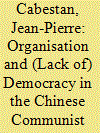|
|
|
Sort Order |
|
|
|
Items / Page
|
|
|
|
|
|
|
| Srl | Item |
| 1 |
ID:
146528


|
|
|
|
|
| Summary/Abstract |
This article attempts to answer the puzzle of why, amongst undemocratic states, some regimes are more authoritarian than others. The author contends that differing party structures result in different authoritarian outcomes. A ruling, competitive authoritarian regime that has a party structure akin to a cadre party, or where there is little or no intra-party democracy, is more likely to be more authoritarian than a party which has intra-party democracy. The lack or absence of intra-party democracy ensures that elites remain cohesive and that there are lesser opportunities for the opposition to take advantage of divisions in the party, whereas in a party with intra-party democracy, there is a greater possibility of elite disunity, which could be capitalised on by the opposition, and there is also a greater likelihood of a different ideology being propagated by defectors from the party. The cases of the People's Action Party in Singapore and the United Malays National Organization in Malaysia are used to illustrate the author's case.
|
|
|
|
|
|
|
|
|
|
|
|
|
|
|
|
| 2 |
ID:
144539


|
|
|
|
|
| Summary/Abstract |
Since the early 1990s, the Chinese Communist Party (CCP) has put in place a series of measures to allow more Party members to participate in the cadre selection process. “Intra-party democracy” was promoted as a remedy to solve the corruption and social tension that resulted from overly concentrated personnel power. How effective are these formal procedures in constraining the appointment power of core Party leaders and institutionalizing the influence of a larger group of cadres? Drawing on archival research, interviews and quantitative data, this paper examines two components of intra-party democratic reform: “democratic recommendation,” which serves as a gateway to cadre promotion, and the semi-competitive elections at Party congresses. This in-depth study finds that the efforts to expand bottom-up participation are hindered by loopholes in formal regulations, informal practices and the frequent rotation of Party officials. Meanwhile, the reform measures have brought changes to the personnel system by complicating the Party secretaries' exercise of appointment power and altering the incentives of ambitious cadres. The implementation of intra-party democracy could improve the vitality of one-party rule, and its ebbs and flows imply a divide within China's top leadership over the direction of political change.
|
|
|
|
|
|
|
|
|
|
|
|
|
|
|
|
| 3 |
ID:
189219


|
|
|
|
|
| Summary/Abstract |
There has always been a lack of democratic life in the Chinese Communist Party (CCP). Former CCP Secretary General Hu Jintao attempted in the first decade of the twenty-first century to promote reform, including a revision of the party constitution, aimed at enhancing “intra-party democracy” (党内民主, dangnei minzhu). However, Xi Jinping has put on hold this plan, fully restoring the verticality of the institution where it may have been weakened. This article has three objectives. First, it compares the successive versions or iterations of the CCP constitution in the last 100 years and analyses all the changes related to democratic centralism, elections, and democracy that have been introduced. Then, it assesses Hu's reforms and their failure. Finally, it explains why the CCP cannot reform and democratise as long as it remains a party-state and China remains a one-party system.
|
|
|
|
|
|
|
|
|
|
|
|
|
|
|
|
| 4 |
ID:
144829


|
|
|
|
|
| Summary/Abstract |
The British Labour party's recent adoption of a partially open primary for the selection of its leader conforms to a trend seen across many European political parties of increasing rights and privileges in internal party decision-making and expanding opportunities for more loosely affiliated supporters to participate in party activity. This dual trend can be seen as a response to changes in the membership environment, greater individualisation of political participation and growth in social movement politics and online activism. Yet as much as parties are responding to a changed membership environment, they are also driving that change, increasingly blurring the distinction between members and supporters. This article examines the recent impact of this change within the British Labour party and argues that, in line with Susan Scarrow's theory of ‘multi-speed’ membership, the Labour party's experiment in expanding affiliation options has led directly to a tension in locating the source of authority within the party, creating a challenge for its new leader in accommodating his new supporters within his party's representative traditions.
|
|
|
|
|
|
|
|
|
|
|
|
|
|
|
|
|
|
|
|
|